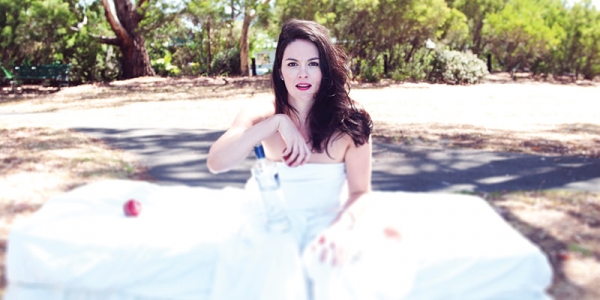MTC’s production of Cock, UK writer Mike Bartlett’s popular play about a love triangle, sees the stage stacked with pillows, suggesting a bed or a comfort zone or a safe place to fall. The pillows provide modesty for the raunchier moments and go a little way to create the sense of intimacy this play needs.
One of the problems with this production of Cock is the disconnect between the set and the ‘size’ of the play – this claustrophobic, intimate, intense drama with only four characters would be better placed in a much smaller theatre. It got lost in the Fairfax and I had trouble hearing many of the lines. The acting is strong and direction original; director Cáceres has a sure touch when it comes to balancing the subtle and dramatic; entrances and exits in particular carry dramatic weight, although there was a bit too much faffing about with the pillows.
The real problem with this production though, lies in the script. An exploration of sexuality it is not. The writer has a beef about labels so makes a work that pretends to engage with deep issues of sexual identity while entirely refusing to look at two crucial aspects of the story, namely that John is in love with two people at once and that he’s discovered he’s bi-sexual. Why anyone should take issue with ‘bi-sexual’ as a label beats me (apart, perhaps, from its implication of there being only two sexes, or its historical stigma) but the term is only uttered once, and John never gets to say either ‘I must be bi’ or ‘I love you both’, an omission which dilutes everything the characters are banging on about and makes the whole thing pretty silly. And that’s all they’re doing really, banging on, in quirky cute little phrases and some witty one-liners.
The play seems to be saying that it’s not the gender that matters it’s the individual when it comes to whom you love –a worthy stance but if it’s really about the character rather than the issue, it’s hard to buy because the characters are sketchy and pretty similar to one another (except for the dad). If it’s about the issues then shouldn’t it deal realistically with them? Unless the work is trying to do something else altogether, in which case I missed it. A lot of noise is being made about a play which appears to be controversial but doesn’t actually wrestle in any interesting way with either its subject matter or its subjects. The obvious solution, that M and W share John, is never even suggested. Not that you can really see why either of them want him.
BY LIZA DEZFOULI

